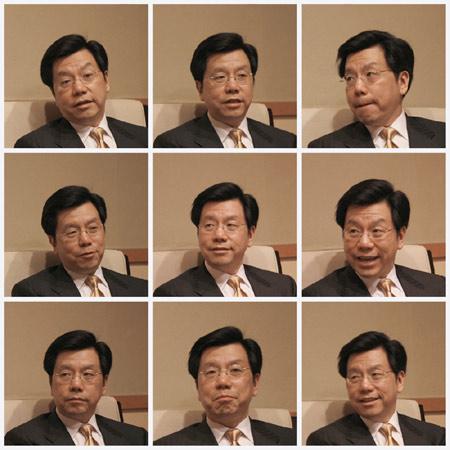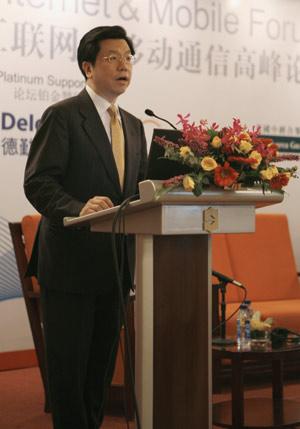
Kai-Fu Lee, chairman and CEO of Innovation Works, talks about his company in an exclusive interview with chinadaily.com.cn, May 31, 2010. [chinadaily.com.cn]
E-commerce and mobile Internet will enter a pace of fast development in the next few years in China, Kai-Fu Lee, the chairman and CEO of Innovation Works said in Beijing on Monday.
Lee, who quit Google and launched a venture business platform called Innovation Works in September, revealed at the TMT China 2010 Internet & Mobile Forum that his company had already funded nine projects in the areas of E-commerce and mobile Internet, and some of them would be ready this year.
"We are putting much more emphasis on mobile computing. Seven of the nine projects are in mobile computing; two are in e-commerce," he said later in an exclusive interview with chinadaily.com.cn.
"Mobile Internet and e-commerce are growing so rapidly... If we do not act quickly, we may miss out," he added.
E-commerce and mobile Internet will trigger the third wave in the development of Chinese Internet, Lee said in his keynote speech at the forum, held by China Entrepreneurs, an organization dedicated to fostering the growth of entrepreneurship in China.
He said that in the history of Chinese Internet, the first wave generated a batch of portals like Sina and Sohu, and the second wave gave birth to technical websites like Tencent, Baidu and online games. However, the real boom generated by e-commerce, which is already happening in the US, has not yet come in China.
The development of cloud computing, gaming, mobile computing and e-commerce would be the driving forces behind the development of Chinese Internet and bring abundant business opportunities, Lee said, which are also the areas that his venture is targeting.
Mobile Internet
"I see even greater opportunities in mobile computing as China's mobile users have reached 230 million and three telecom operators all began to provide 3G services," said Lee, who led his venture to fund seven projects out of nine in this area.
He said the US had overtaken Japan as the world's most developed market for mobile Internet. "The success of mobile Internet in the US led by iPhone and Android was, to a great extent, supported by the virtuous circle of three key factors: abundant equipment, diversified applications and capable bandwidth, but none of these problems has been solved in China," he said.

Kai-Fu Lee, chairman and CEO of Innovation Works, gives a keynote speech at the TMT China 2010 Internet & Mobile Forum, held by China Entrepreneurs in Beijing on May 31, 2010. [chinadaily.com.cn]
However, Lee still believed that the lack of these factors would not stop the coming of the boom of mobile computing in China, as 83 percent of Chinese Internet users were young people below 30 years old, who were willing to spend 1,000 to 2,000 yuan ($ 146.46 to 292.91) on a cell phone capable of surfing the Internet. So developing mobile Internet in China should target young people, he said.
He made five predictions about China's mobile computing: First, high-end Internet mobile phones costing 1,500 yuan each will be developed this year and ones below 750 yuan will be introduced next year; second, mobile computing applications should be developed by providing better experiences but requiring less bandwidth as 3G will still be expensive in China; third, applications should stay focused on entertainment and social networking in the next two to three years; fourth, applications and services should be provided free of charge at first and later cost money for upgrades or virtual goods; fifth, mobile computing would bring business opportunities to application developers.
E-commerce
Lee's venture also invested in two projects of e-commerce as he saw great business opportunities when China's e-commerce has achieved a scale of $36 billion in 2009, up 107 percent from 2008.
As problems of payment and logistics have successfully broken the bottleneck in the past year, more and more young people would shop online, Lee said.
"Although customer-to-customer (C2C) sites are very successful now, we should never undervalue the potentials in business-to-consumer (B2C) websites as C2C sites would leave some problems unsolved," Lee said. "B2C sites are worth trusting and will be able to provide better services."
He also pointed out that larger opportunities brought by the thriving of e-commerce such as the growth of online advertisement would increase the total value of the Internet.
Lee divided the investing opportunities of e-commerce into six areas: search (seek what to buy), decision making (decide what to buy in online communities), shopping, payment, logistics and platforms (such as Taobao).
He said although China had many successful e-commerce companies, it did not have a company covering all six sectors like Amazon. He suggested investors inject funds into e-commerce companies providing functions like search, decision making and platforms, which are more characteristics of the Internet rather than B2C websites providing shopping, payment and logistics, which are more like traditional businesses.
Innovation Works helping fund Chinese tech startups
After leaving Google in September, Lee started his own venture, Innovation Works, aimed at providing help and early stage funding to Chinese startup companies in e-commerce, mobile computing and cloud computing.
The company has so far hired about 100 engineers brainstorming ideas internally, flushing them out and building feasible projects to a stage where more investment will come to sustain future development. The company also seeks good external projects to invest in.
Lee said young Chinese entrepreneurs were lacking experience and seed funding in starting up companies as Chinese venture capitals (VCs) prefer later-stage investments that carry less risk and higher returns. So Innovation Works will provide seed funding and all possible help to Chinese entrepreneurs, hoping to generate valuable companies every year, he said.
Every year, the company will develop about 20 projects and select five to 10 projects to take to the next stage. Innovation Works has an individual fund to provide angel funding, series A and series B. The last two rounds of investment will include investment from other VCs and gradually let external investment take the lead.
Lee hoped that Innovation Works could work together with other investors to accelerate the coming of the third wave of Chinese Internet.





